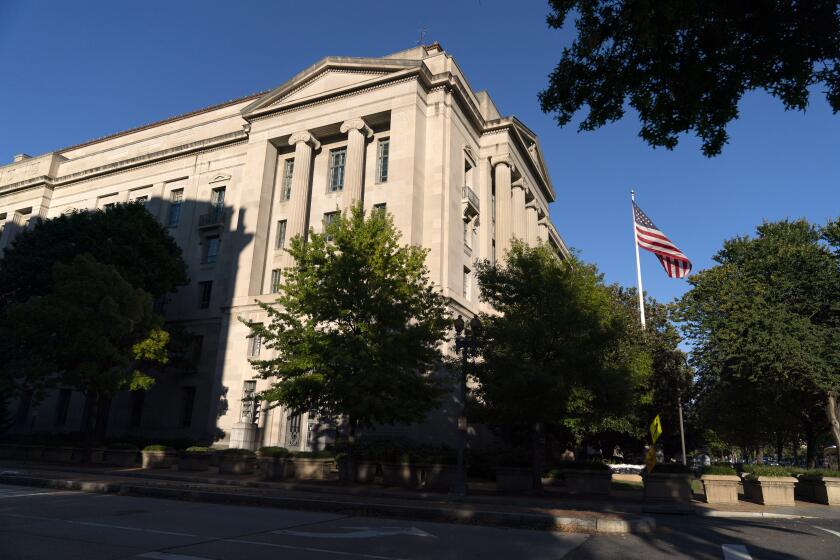How to detrumpify America
- Share via
President Trump came to office unencumbered by close study of our founding documents.
From the start, there was only one bit of the Constitution he found compelling: “I have an Article II, where I have the right to do whatever I want,” he said.
Thus misinformed, he applied the lessons of his business career and set out to see what he could get away with.
Not surprisingly, his four years in office have tested the resilience of American democracy.
We found ourselves asking: How close could a headstrong president take the United States toward authoritarian rule? How many rules could he break before leaving the Constitution in shreds?
A Trump aide at the Justice Department has been banned from the building after trying to pressure staff members for sensitive case information.
Under Trump, presidential norms fell like dominoes. He refused to release his income tax returns. When one of his golf resorts ran short of guests, he proposed holding an international summit there. He demanded that Justice Department prosecutors investigate his opponents and go easy on his friends.
He pardoned two former advisors suspected of concealing misdeeds on his behalf after they were convicted of federal crimes. When whistleblowers filed official complaints, he retaliated, and when Congress subpoenaed executive branch officials, he ordered them not to comply. When winning Senate confirmation for Cabinet nominations became irksome, he appointed “acting secretaries” instead, explaining that “it gives me flexibility.”
I could go on, but you get the idea.
The good news is that most of democracy’s guardrails held. Federal courts struck down dozens of Trump’s orders and regulations. His own aides derailed some of his worst ideas, including the G-7 summit at the golf club. We were lucky in one respect: As an autocrat, Trump wasn’t very competent.
Still, the lesson should have been sobering: Presidents’ powers are restrained mostly by their willingness to observe unwritten rules and political constraints.
If a chief executive ignores those norms, there is little to stop him.
That’s why the next president and Congress need to strengthen the guardrails — much as happened after Nixon resigned amid the Watergate scandal in 1974.
We need a period of “detrumpification,” a process to make sure no future president sees Article II as a blank check.
“Trump showed us [that] shamelessness in a president can be really empowering,” Jack Goldsmith, who was assistant attorney general under President George W. Bush, told me. “A future president of the left or the right could learn from him — and, being more competent in wielding executive power, could do much greater damage.”
Goldsmith and Robert F. Bauer, a former counsel to President Obama, have jointly produced a long list of reforms they hope Congress and the Biden administration will take up.
Their suggestions include prohibiting future presidents from pardoning themselves and making it clear that a president who dangles pardons before potential witnesses can be prosecuted for obstruction of justice, a question that is unsettled under current law.
Some of their proposals have already been embraced. President-elect Joe Biden has already said he will prohibit White House aides from attempting to influence Justice Department investigations and will give the department’s inspector general full power to investigate any violations.
But to have lasting effect, some proposals will require action in Congress. Goldsmith is optimistic the legislation could attract bipartisan support, including measures to require presidential campaigns to report any contact with foreign governments.
“After Trump is gone, enacting these laws may not be seen as directly affronting him,” Goldsmith said.
Some legislation is already in the works. House Democrats, including Rep. Adam B. Schiff (D-Burbank), have introduced a bill that would increase protection for inspectors general and whistleblowers and strengthen Congress’ ability to enforce subpoenas.
Some reforms under discussion — the ones I’m keenest on, as you might expect from a reporter — lean toward more transparency in government.
One would require presidents and candidates for president to release their tax returns each year, as most already do.
Another would require more detailed public reports on a president’s financial holdings. No more blind trusts.
A third is strengthening the Presidential Records Act, to make sure presidential records don’t disappear.
And here’s another one in my self-interest: Presidents and federal agencies should be barred from using investigations or other actions to retaliate against media organizations whose coverage they dislike. In case you’ve forgotten, Trump urged the U.S. Postal Service to raise Amazon’s shipping rates because he dislikes the Washington Post, owned by Amazon chief executive Jeff Bezos.
All these ideas are debatable, of course. The important thing is to have a debate — soon, before our memories of the last four years fade.
More to Read
Get the L.A. Times Politics newsletter
Deeply reported insights into legislation, politics and policy from Sacramento, Washington and beyond. In your inbox twice per week.
You may occasionally receive promotional content from the Los Angeles Times.












